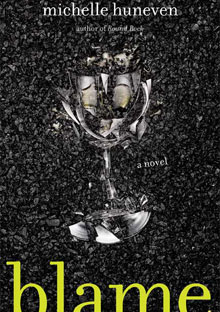Reading Questions for Blame
Warning: May contain spoilers

1. How were you affected by the shift from Joey's world to Patsy's? What does the closing line of part one (capturing Joey's belief that her mother had not died but was alive and well at the Bellwood Hotel) say about the nature of hope, illusion, and grief?
2. How did your impressions of Patsy change throughout Blame ? What cultural shifts does she experience over the novel's two decades?
3. Were you surprised that Patsy was a high achiever in academia? What makes history an appropriately ironic field for her?
4. When you first read about Patsy's sentencing, did you think it was just? Did prison seem like an appropriate consequence? Given today's drunk driving laws and treatment options, does her sentence seem light or extreme?
5. Behind bars, what version of a family does Patsy find? How do her tenuous friendships there compare to her relationships with her mother, father, and brother?
6. Why is it noteworthy that Jane and Jessica Parnham were Jehovah's Witnesses? How does Mark seem to feel about their faith?
7. What is Mark Parnham's motivation in visiting Patsy? How are they affected by each other?
8. How do Patsy's days with the firefighting crew serve as a metaphor for her life? What does Martin's crayon drawing of a stick figure dousing burning trees (described near the end of part two) indicate about his understanding of Patsy?
9. What is ideal about the support provided by Brice and Gilles? How do Gilles and Patsy bond, and why do they become such good friends? What is the role of Alcoholics Anonymous in Patsy's life?
10. Discuss the other approaches to sobriety Patsy experiences, including deprivation in prison; accountability to her parole officer, Jeffrey Goldstone; and sessions with Mrs. Silver. Why does she succeed in staying sober?
11. How is Patsy influenced by her ESL students? What common ground does she share with them?
12. How does Patsy's marriage to Cal compare to her earlier relationship with Ian? What does she want in a relationship? How does her understanding of love change throughout the novel?
13. At the end of chapter 26, Cal tells Patsy that no matter what the truth is about the Parnham deaths, "what happened got you to where you needed to be." Ultimately, what did it take for her to get sober?
14. Much of Patsy's adult life has been spent in atoning for the deaths of Jane and Jessica Parnham. What were the various aspects of her atonement? Were any aspects regrettable or unnecessary?
15. How did the revelations about Bill Hogue transform your understanding of the novel? What does his crime indicate about the way society handles retribution and other morality-based "debts"?
16. Discuss the novel's title. Why was Patsy so willing to accept the blame for the accident? How much blame is she willing to relinquish? Where should the blame for the Parnham deaths lie?
17. How does Blame amplify the themes explored in Michelle Huneven's previous novels? What are the hallmarks of her storytelling style?
Read O 's review
Get more reading guides



